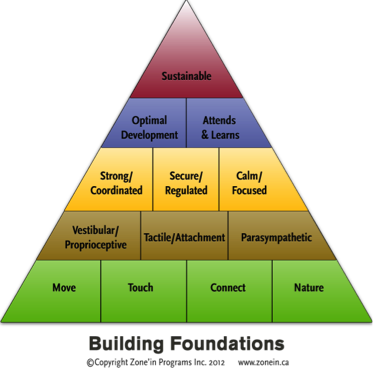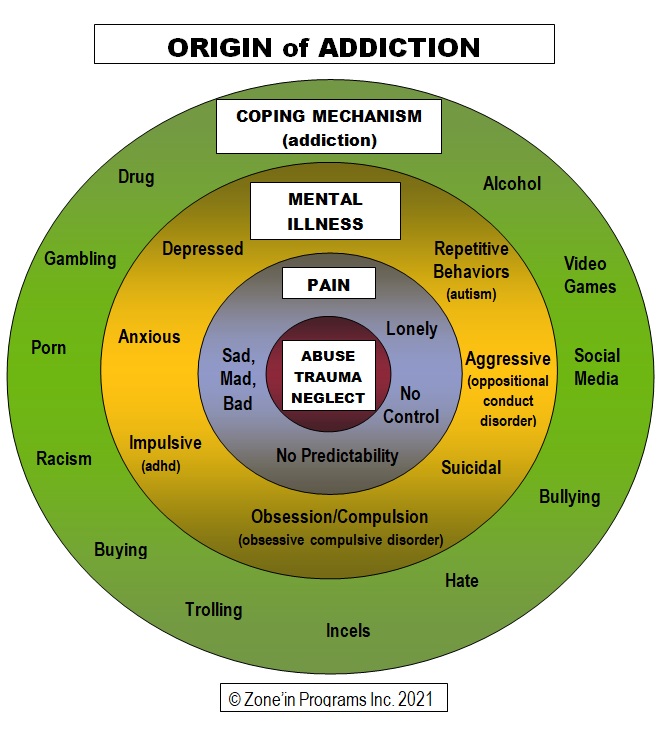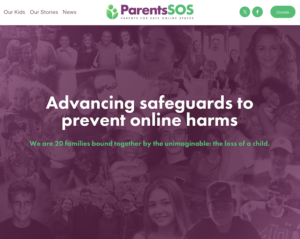Every parent I’ve met professes profound love for their children and truly strives to create healthy and functional family lives. Parents who come from dysfunctional families have a much harder time navigating the pitfalls of parenthood as they simply cannot do what they were not taught. Being a functional attachment figure to a wee little child’s persistent needs requires a parent who has been able to put their own generational wounds behind them. Along comes the cell phone. In the absence of a functional attachment with their family of origin, parents are prone to creating unhealthy relationships with their devices. In the absence of a primary attachment figure, children follow the parents lead and form unhealthy attachments to their own devices. The cell phone becomes an interface between family members prohibiting a life sustaining and essential component of every childhood…healthy attachment. Addictions to devices really should be viewed as a coping mechanism for family dysfunction carried through generation after generation. Reframing child screen addiction as a coping mechanism for family dysfunction allows families, teachers and clinicians to focus on improved family relationships as a primary intervention in treating addiction. This article intends to cast light upon the probable origins of child screen addiction and offers the Healthy Families Questionnaire to guide families toward actions to improve healthy family relationships.
When I ask parents what their goals are for their child’s future they talk about happiness and success primarily in academics, relationships and health. As a pediatric occupational therapist, I assess family habits which limit goal attainment and frequently find that screen overuse is a predominant and disruptive factor. Some components of a functional family might include communication, affection, respect, play, responsibility and rules all of which diminish with screen overuse. Parents (and teachers) who overuse and overly rely on screens are turning their backs on children and in doing so, fail to meet their most basic needs for optimizing growth and academic success. This systemic over reliance on screens has an overwhelming effect on children and ultimately if left unchecked, leads to what could in some extreme cases be viewed as child neglect, trauma and abuse. In the absence of ‘real’ families and schools, children are attaching to their ‘virtual’ devices as a coping mechanism (Montage 2020) to help them to deal with system failures. I repeatedly quote in my workshops on screen overuse “It’s never the child with the problem, it’s the systems surrounding children that need to change”. What I mean by ‘systems’ are family, education and health.
With recent Covid-19 restrictions, both home and school use of screen devices has risen markedly with many families and schools reporting managing healthy screen use is ‘virtually’ impossible. As parents, teachers and clinicians struggle to raise, educate and treat children, they have unknowingly created a virtual world devoid of all the factors required for optimizing child growth and success: movement, touch, human connection and nature. Screen-centric families are forgoing traditional ‘tried and true’ routines for toilet training, nap/bedtime, meals, outside play and chores ultimately creating children who are overly dependent, delayed, anxious, depressed, unable to sleep, have difficulty socializing, have learning difficulties, can’t self-regulate their emotions and/or have difficulty listening or completing requested tasks.
Just as there are screen-centric families, there are also screen-centric schools. Screens in schools have limited research evidence as an effective learning tool (see Every School’s Research Summary 2019) yet has become the default education choice by most schools both pre- and post-Covid 19. Dr. Dimitri Christakis a renown pediatrician, director of the Center for Child Health, Behavior and Development at Seattle Children’s Research Institute and editor-in-chief of JAMA Pediatrics states children are “social animals” and using a decision analytical model found that life expectancy of children would be greater if they attended school in person than online, yet educations systems continue with virtual instruction. Reflecting on above Building Foundations graphic would guide schools toward evidence-based practice of outdoor or nature-based education models where half the children are in classrooms for half the day and outside for the other half. Outdoors would provide access to the 4 critical factors for optimizing development, attention and learning as evidenced by prolific scientific research (Dresp-Langley 2020).
Whether you are a parent, teacher or clinician reading this article, a first step toward gaining perspective regarding family function might be for families to fill in the Healthy Families Questionnaire. This scale will help families identify some of the components of a healthy family and discover things to do to improve healthy family function. The suggested process in filling out the Healthy Families Scale is to have a family discussion while answering questions and then working together as a family team to come up with ideas for improving family function and overall health. In treating children who overuse or are addicted to screens, we must bear in mind that a family centred approach is crucial for the process of family and generational healing. Addiction treatment must include endeavours to address the underlying causal factors of generational family neglect, trauma and abuse or we will be treating the wrong person for the wrong reason. We must help families to recognize that they are not a “bad” family but rather are a family who has survived years of dysfunction. Shining a light on a path toward healthy function will provide a framework with which to move forward toward generational healing.
Cris Rowan is a pediatric occupational therapist, biologist, international speaker and author of “Virtual Child – The terrifying truth about what technology is doing to children”. Cris is CEO of Zone’in Programs Inc., collates research for the monthly Zone’in Child Development Series Newsletter, and writes a feature article for her blog Moving to Learn.
Montag C, Elhai JD. 2020. Discussing digital technology overuse in children and adolescents during the COVID-19 pandemic and beyond: On the importance of considering Affective Neuroscience Theory. Addictive Behavior Reports. Vol. 12;100313.
Every School’s Research Summary. Oct. 2019. Every Schools website. Retrieved on Jan. 11, ’21. Includes prolific research regarding failure of schools to following evidence-based practice with use of screens in education.
Christakis D, Van Cleve W, Zimmerman F. 2020. Estimation of US Children’s Educational Attainment and Years of Life Lost Associated With Primary School Closures During the Coronavirus Disease 2019 Pandemic. JAMA Netw Open. 2020;3(11):e2028786.
Dresp-Langley B. Children’s Health in the Digital Age. 2020. International Journal of Environmental Research and Public Health. 2020 May 6;17(9):3240.








2 Responses
This systematic review and analysis has shown nationwide studies of the prevalence of child maltreatment have been conducted, using methods of administration suited to the setting, and involving child participants, adult participants, or both. However, there are few such nationwide studies of all five or even four maltreatment types, leaving substantial gaps in knowledge about the experience of childhood maltreatment in nearly all countries. Overall, our review and analysis indicates many of the completed studies are generally sound, but some take a more comprehensive and conceptually robust approach to provide nuanced, useful data for researchers and policymakers. To enable measurement of progress against the United Nations Agenda for Sustainable Development Goal 16 of reduction of child abuse, many countries need to invest in robust national prevalence studies. Such studies should measure exposure to domestic violence in addition to physical abuse, sexual abuse, emotional abuse, and neglect. Studies should use an instrument with demonstrated validity and reliability, and must ensure maltreatment types are operationalised appropriately in the questions asked. If participants are children or adolescents under age 18, studies should capture past year incidence, as well as childhood prevalence. Information should be captured about the specific nature, severity and frequency of the maltreatment, and the relationship of the child to the person who inflicted the acts. Such data can best inform the development and monitoring of nationwide prevention efforts.
Well said! The Adverse Childhood Experiences (link below) is an excellent tool for identifying child neglect, trauma and abuse and has numerous studies showing poor health outcomes with higher ACE’s scores.
https://www.cdc.gov/violenceprevention/aces/index.html
Defining the scope of child maltreatment will be interesting to debate e.g. is NEGLECT going to include parents who ignore children in preference to their phones, or teachers/schools who provide 1.5 hours per day of Zoom instruction and then expect the students to do the rest of their “learning” by themselves online? Is TRAUMA going to include allowing pre-schoolers to play violent videogames? Is ABUSE going to include parents who yell and scream constantly at their kids all day because they have failed to establish family rules, schedules, routines and structure so the kids are always “acting out” because they usually can get away with it?
Continued focus on sad/mad/bad children who are detaching from humans and attaching to devices is not getting to the root of the problem which is parental addictions and dysfunction. I’m hoping that the Healthy Families Questionnaire is a start toward helping families understand what is functional parenting and get on a track of putting down the phone and picking up their kids.
How do you think we can help parents and teachers understand the child’s need for movement, touch, human connection and nature and enable them to build it into their daily structures??